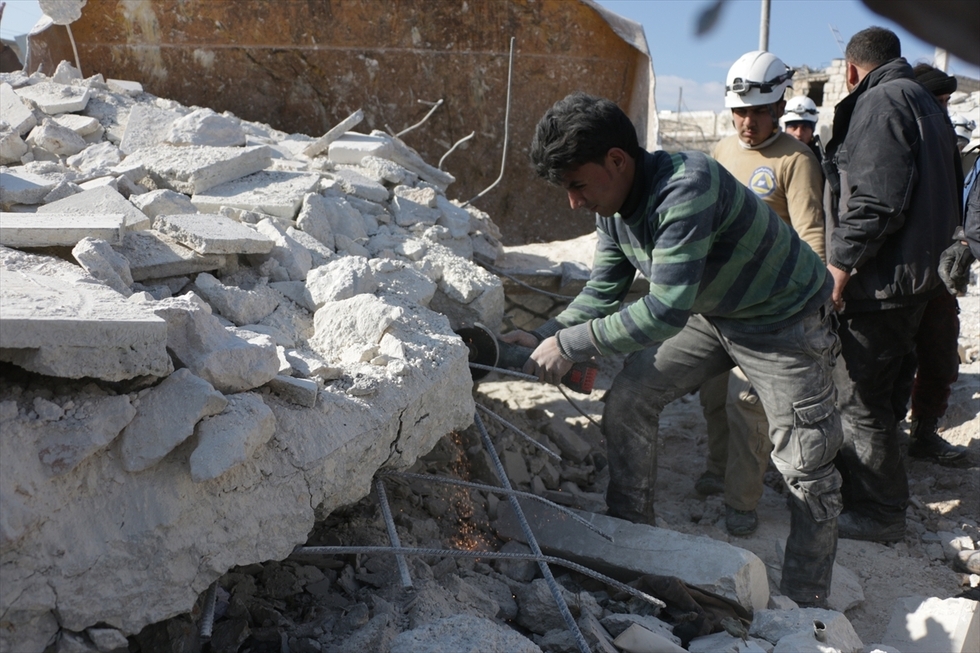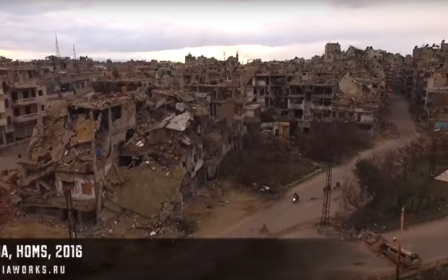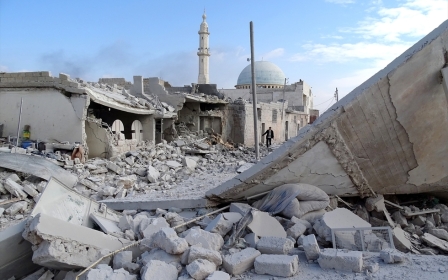Syria talks on 'temporary pause' as rebels on back foot in Aleppo

The Syria peace talks in Geneva aimed at ending the civil war will be paused temporarily until 25 February, the UN special envoy for Syria announced on Wednesday.
"There's more work to be done," Staffan de Mistura told reporters in Switzerland. The talks officially began on Monday night but quickly stalled on Tuesday due to ongoing advances by the Syrian army which is being backed by Russian planes.
"I have indicated from the first day I won't talk for the sake of talking. I therefore have taken the decision to bring a temporary pause. It is not the end or the failure of the talks. Both sides indicated they are interested in having the political process started."
And later on Wednesday, chief coordinator Riad Hijab anounced that the main opposition group would not return to talks until its humanitarian demands were met.
Hijab told reporters the group "will leave Geneva tomorrow (Thursday) and will not return until the humanitarian demands are met or (we) see something on the ground."
The British government announced £1.2bn ($1.74bn) in aid for war-torn Syria and its neighbours on Thursday, ahead of a donors' conference in London.
"More money is needed to tackle this crisis and it is needed now," Prime Minister David Cameron said in a statement announcing the pledge, which will fund education, jobs and humanitarian relief in Syria, Jordan, Lebanon and Turkey.
The promise amounts to an extra $1.74bn, to be spent between 2016 and 2020, to address "the world's biggest humanitarian crisis", Cameron's office said. Britain has already agreed to spend $1.74bn on the region.
It comes as world leaders are due to gather in London to try to raise $9bn for the millions of Syrians affected by five years of civil war and to address an acute refugee crisis.
On Tuesday, the Syrian army warned residents of Aleppo that they face "bloodshed", "destruction" and the death of their loved ones if they did not expel rebel fighters from the city within 48 hours, in leaflets dropped from government helicopters.
Pro-opposition news sites published one of the leaflets, which they said were dropped on Tuesday night over rebel-held districts of Aleppo.
The leaflet told residents: "The war is coming to its end. It will be tragic for all of us if it ends with the death of your loved ones and the destruction of your homes.”
“The leaders of the Arab Syrian Army are proposing [either] bloodshed or [a chance to] avoid this fate by expelling the foreign and intruding fighters from your area – safe passage for their exit will be arranged.”
The leaflet offered safety to local fighters provided that they hand over their weapons and all foreigners fighting in their ranks – it did not specify which groups or nationalities it addressed.
“This opportunity is on the table until 4 February…if you do not accept, reconciliation will cease and we will resume fighting."
The leaflet ended by urging residents to “save your lives and your homes”, and was signed off by the leadership council of the armed forces.
Government forces on Wednesday continued to press their offensive against the city and surrounding areas, breaking the months-long rebel siege of two Shia-majority villages north of Aleppo, Zahraa and Noble, and cutting off the main supply routes into Aleppo city, military sources told AFP. Opposition forces have denied this.
Fighting around Aleppo has intensified this week, with reports that at least 750 fighters from the Nusra Front left the city to join battles against pro-government forces in the small town of Ratyan, some 25km to the north.
The offensive, which has been backed by Russian air strikes, has been blamed for the collapse of the peace talks with the UN envoy to Syria who accused Russia of choosing “military escalation against the Syrian people”.
Russia’s foreign minister, Sergei Lavrov, said on Wednesday that his forces would continue their bombing campaign in Syria until “terrorist organisations” are defeated.
"Russian air strikes will not cease until we truly defeat the terrorist organisations ISIL and Jabhat al-Nusra," Lavrov said during a visit to Oman. "And I don't see why these air strikes should stop."
Though Russia maintained that its air strikes only target fighters and facilities of groups like Islamic State and al-Nusra Front, al-Qaeda’s Syria affiliate, activists on the ground say large numbers of civilians have been killed.
Meanwhile, a Russian military adviser has been killed in Syria by shelling from the Islamic State group, the Russian defence ministry told Ria Novosti news agency on Wednesday.
The officer was training Syrian soldiers loyal to President Bashar al-Assad in the use of "new weapons" when he was "fatally wounded" on Monday, the ministry was quoted as saying. No details were given about where the attack took place.
The Syrian Observatory for Human Rights, a British-based monitoring group with a network of sources on the ground in Syria, said three Russian soldiers were also wounded in the attack, which it said took place in an area where IS does not have a presence.
The Observatory said Wednesday's incident took place in the northwestern province of Latakia, where it says rebel groups fighting against the regime operate, but not IS.
The Syrian opposition's chief negotiator, who arrived in Geneva on Wednesday, said it was "delusional" to think the opposition could form a unity administration with members of the current government.
"A political solution is very important for the HNC, but it is not more valuable than the blood of the Syrian people."
"Whoever wants us to go into a unity government with these thugs who kill children is delusional."
On Tuesday, pro-opposition news site the Syrian Press Centre published a video showing a young child being pulled alive from the rubble after a concrete column collapsed on him.
Activists said the footage was filmed by civil defence volunteers in the town of Haritan – just north-west of Aleppo - following a series of Russian air strikes on Tuesday.
New MEE newsletter: Jerusalem Dispatch
Sign up to get the latest insights and analysis on Israel-Palestine, alongside Turkey Unpacked and other MEE newsletters
Middle East Eye delivers independent and unrivalled coverage and analysis of the Middle East, North Africa and beyond. To learn more about republishing this content and the associated fees, please fill out this form. More about MEE can be found here.




